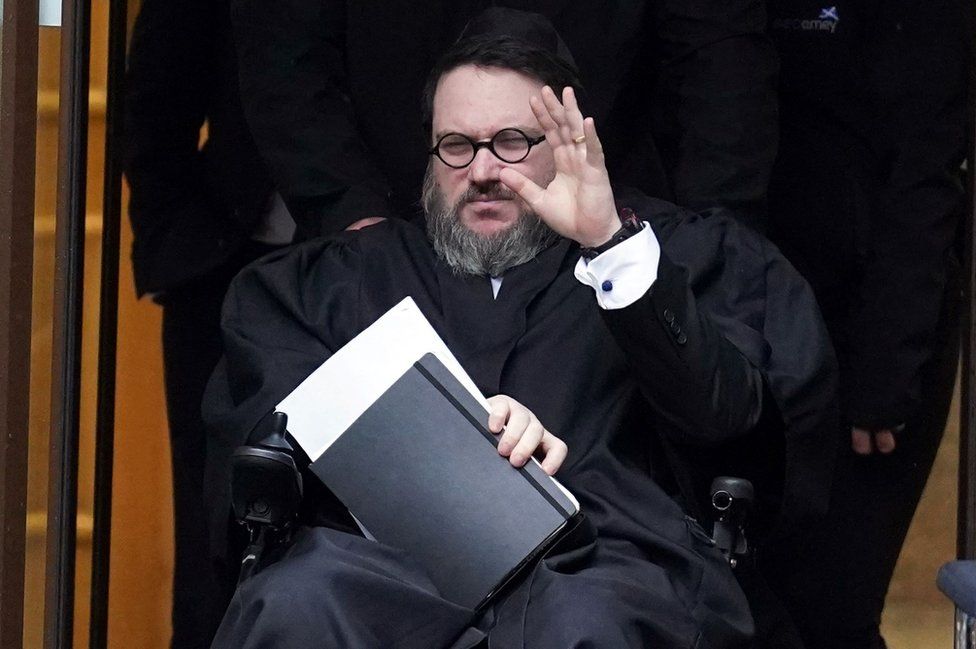An American fugitive who faked his own death can be extradited from Scotland to his homeland, a sheriff has ruled.
Nicholas Rossi, who claims to be Arthur Knight and a victim of mistaken identity, is wanted in Utah to face rape charges.
The final decision on his extradition now rests with Scottish ministers.
Rossi, 35, was being treated for Covid-19 when he was arrested at the Queen Elizabeth University Hospital in Glasgow on 13 December 2021.
- Nicholas Rossi’s mental health ‘should not stop extradition’ – expert
- Nicholas Rossi: Arrested man is missing US fugitive, court rules
- Nicholas Rossi: The man accused of being a fugitive
He appeared before Edinburgh Sheriff Court via videolink on Wednesday to learn the outcome of the case.
Earlier in the morning the fugitive sat slumped in his wheelchair before the camera in Edinburgh’s Saughton Prison with his face hidden.
But as Mungo Bovey KC was asking for his client to be excused, Rossi raised his head and shouted at the sheriff, calling him a “disgrace to justice”.
At that point the clerk cut the video connection.

When the court reconvened later Sheriff Norman McFadyen said that there was no legal barrier to extradition.
He added: “It follows that I must send the case of the requested person Nicholas Rossi to the Scottish ministers for their decision whether he is to be extradited.”
Last November Sheriff McFadyen ruled that he was Nicholas Rossi and not Arthur Knight, as he had repeatedly claimed, with the bizarre story making headlines on both sides of the Atlantic.
Authorities in the US have said Rossi was known by several aliases, including Nicholas Alahverdian.
He was involved in local politics in the state of Rhode Island and was a critic of the state’s child welfare system.

In December 2019 he told media in his home state that he had late-stage non-Hodgkin lymphoma and had weeks to live.
Several news outlets in Rhode Island reported that he had died in February 2020.
A memorial posted online described him as a “warrior that fought on the front lines for two decades” for children’s rights and said his ashes had been scattered at sea.
But less than two years later Rossi, who was the subject of an Interpol wanted notice, turned up on a hospital ward in Glasgow during the pandemic.
In March last year, as he awaited his extradition hearing, the fugitive was interviewed by BBC Scotland reporter Steven Godden in Glasgow.
This video can not be played
To play this video you need to enable JavaScript in your browser.
Rossi, who was in a wheelchair and wearing an oxygen mask, maintained he was not Nicholas Rossi – and claimed to have never even been to America.
He also introduced his wife, Miranda Knight, and claimed the couple got married in Bristol in 2020.
Rossi brought a pile of documents to BBC Scotland’s Pacific Quay headquarters but said he had no birth certificate as he was adopted in Ireland before moving to London in his teens.
But last November a court in Edinburgh ruled that he was Rossi after hearing that his fingerprints and distinctive tattoos matched those of the fugitive.
He appeared in court in wheelchair every day during the three-day identification hearing, and his accent changed several times while he was giving evidence.

Despite the ruling Rossi maintained he was the victim of mistaken identity – and said he had been tattooed while he was lying unconscious in hospital in an attempt to frame him.
Rossi returned to the city’s Sheriff Court in June of this year for his extradition hearing.
Mr Bovey urged the court to refuse extradition of his client or adjourn proceedings to allow fuller investigation of his mental health.
But advocate depute Alan Cameron said there was no evidence Rossi – who turned up in court wearing what appeared to be a black legal gown – suffered from any significant physical or mental illness and suggested the sheriff could not rely on anything he said.
Sheriff McFadyen had been due to deliver his ruling last month but the hearing was delayed after Rossi tested positive for Covid.
Related Topics
- Edinburgh
- Glasgow
- Utah
